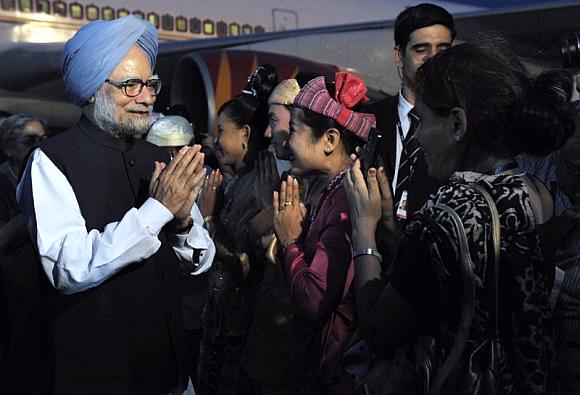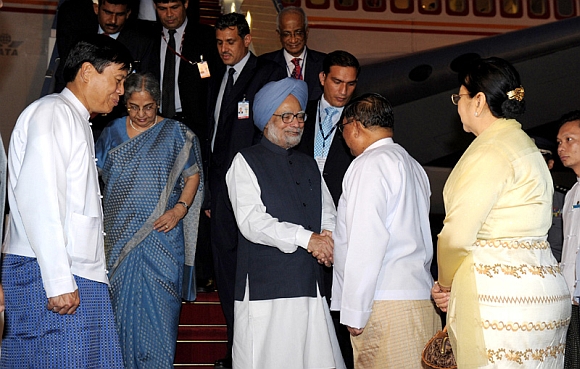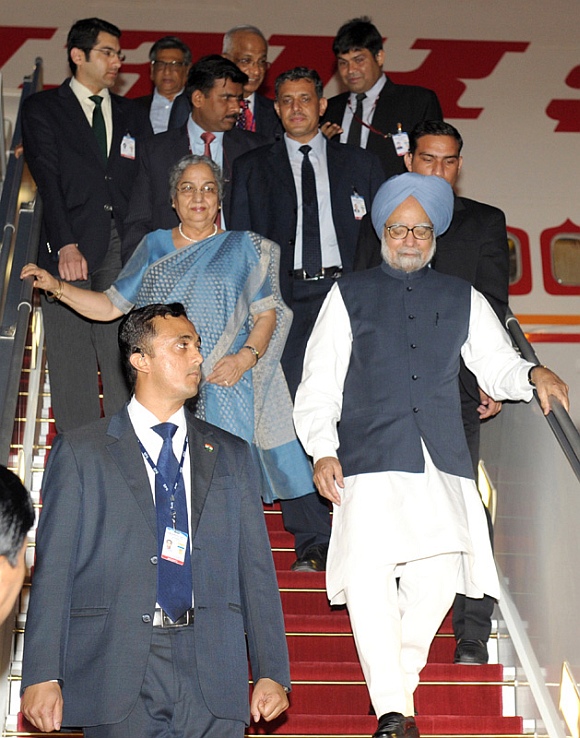
Seeking to elevate India's ties with resource-rich Myanmar, Prime Minister Manmohan Singh arrived in Myanmar on Sunday on a historic visit during which the two sides will chart out a roadmap and take initiatives to bolster relations in several areas, including energy, trade and connectivity.
Singh, who is the first Indian Prime Minister to visit the country in 25 years, will hold talks with Myanmar President Thein Sein as well as opposition leader and democracy icon Aung San Suu Kyi during the three-day trip.
India sees Myanmar as a strategic asset for a closer connection with the Association of Southeast Asian Nations bloc as well as a key partner in counter-insurgency and economic development initiatives in its northeast border areas.
An energy-hungry India is also eying Myanmar's large oil and natural gas reserves and is looking at countering China's influence in the Southeast Asian country. Speaking to reporters, Singh said he was looking forward to meeting the Myanmar leadership and opposition leader Suu Kyi in the next two days.
"We have centuries of religious and civilisational ties with the people of Myanmar and I'm looking forward to my talks here", he said.
During the junta rule, China and India were the main countries that Myanmar interacted with. Though India has a good presence in Myanmar in terms of various projects, China has been very pushy in energy as well as infrastructure sectors besides others.
Sources said India is ready to deal with government of the day in Myanmar to secure its own national interests in terms of security in insurgency-hit northeastern states, a problem which makes Myanmar's support critical as many ultras have taken shelter in the country.
In an apparent reference to Myanmar's mighty northeastern neighbour China, the sources said India has no "expansionist interest" in the economic development of Myanmnar as New Delhi has no choice but to deal with its next door neighbour whatever the colour of the government there.
Since taking office more than a year ago, President Sein has surprised many critics by releasing Suu Kyi from 15 years of house arrest and allowing her National League for Democracy to contest and win parliamentary elections in April this year, freeing other political prisoners, opening talks with ethnic rebels and easing media censorship and restoring labour unions right to strike.
Earlier, in statement shortly before his departure for Nay Pyi Taw, Myanmar's new capital, the prime minister said India attaches the "highest importance" to its relations with Myanmar, a "close friend and neighbour" and "recent years have witnessed significant strengthening and expansion of our bilateral relations".
Singh said his coming visit "will provide an opportunity to review the progress in implementation of decisions taken during the "highly successful visit" of Myanmar President to India in October last year.
...

"We will also consider new initiatives and define a roadmap for the further development of our cooperation in the years ahead", said Singh.
The prime minister, who will hold restricted talks with President Sein before switching over to a delegation-level discussions here tomorrow, said that during his visit he hopes to focus on "stronger trade and investment links, development of border areas, improving connectivity between our two countries and building capacity and human resources".
"We also hope to sign a number of agreements and MOUs to further strengthen our bilateral cooperation in these areas, besides promoting people-to-people contacts", Singh said.
Among the key agreements to be inked tomorrow are a gas exploration deal and a passenger bus linking Imphal with Mandalay, Myanmar's second largest town in south western part of the country.
The Imphal-Mandalay bus service will give a boost to India's neighbourhood diplomacy following the success of similar linkages between New Delhi and Lahore and Kolkata and Dhaka.
Singh, who will also meet Nobel Laureate Suu Kyi in Yangon on Tuesday, said India welcomes Myanmar's "transition to democratic governance and the steps taken by the government of Myanmar towards a more broad-based and inclusive reconciliation process" and offered to share "our democratic experiences" with the country.
Singh said he looks forward to addressing a cross-section of Myanmar society and interact with the Indian and Indian-origin community in Yangon on the final day of his visit.
What sets Singh's visit to Myanmar apart from other Indian leaders' trips to this country in the past is that it reflects the new mood of political reform and movement towards democracy as he is meeting Suu Kyi, for a long a symbol against struggle against military rule, and the civil society.
Singh will have his hands full when he takes up with Myanmarese leadership the issues related to trade and energy as New Delhi lags behind not only China but countries such as Thailand, South Korea and Japan in increasing its profile in economic activities in Myanmar.
While India accounts for 13 per cent of Myanmar's exports, its share in Myanmar's imports is at three per cent, as against China which has the largest share of Myanmar's imports at 38.7 per cent. India's trade gap with Myanmar is pegged at $520 million in 2010.
As political reforms has led to easing of international economic sanctions, including by the US, European Union, on Myanmar, wide-eyed companies from across Asia are making a beeline for a piece of the potentially lucrative pie of the largely untapped natural resources in Myanmar. And Indian businesses have also joined the bandwagon.
A 25-member delegation of captains of Indian industry representing all key sectors are now here coinciding with Singh's visit.
...

Of the companies they represent, three have secured contracts in Myanmar--one for oil exploration, a second got solar energy project and a third is already working on a pipleline project transporting gas to China.
Sources said India has always resisted efforts by Myanmar's military regime and the opposition National League for Democracy led by Suu Kyi to drag it into the vortex of their internal politics and take sides.
While India has always nudged the junta to move towards democracy, particularly after the 2010 parliamentary elections that had been rigged, it has remained engaged with it notwithstanding unhappiness voiced by NLD.
According to India's assessment, the real reason for Myanmar's moving towards political reforms has stemmed from a "sense of patriotism" and a realisation that the constant conflict between the junta and the political forces was leading the country nowhere.
The pime mnister's other engagements include a public address on "India and Myanmar: A Partnership for Progress and Regional Development" where the leading think-tanks of Myanmar and the business captains of the two countries will be present.
As the gateway to South East Asia, Myanmar has been of considerable strategic significance to India and central to its Look East policy, given its energy reserves, and 640 km border with insurgency-hit four northeastern states--Mizoram, Nagaland, Manipur and Arunachal Pradesh.
Security concerns have prompted New Delhi to remain engaged with the military junta in Myanmar despite criticism from Western countries. During a visit to New Delhi in 2010, resident Barrack Obama had chided India for not speaking out over human rights abuses in Myanmar.
Once an outspoken champion of Suu Kyi, India began engaging the Myanmar junta in mid-1990s on security and energy issues and as an apparent counter to China's growing strategic footprints in that country.
India refused to be swayed by international criticism of engaging the Myanmar junta and invested in that country's energy, infrastructure, education and healthcare sectors at a time when the West had sought to apply pressure on Myanmar through economic sanctions which New Delhi has always viewed as counter-productive.
India has always sought to maintain a balance in dealing with Myanmar by remaining engaged with the junta and nudging to move towards political reforms on one hand and reaching out to Suu Kyi.
India stands vindicated as Myanmar takes baby steps towards steps towards democracy inviting a country nowhere. Replying to a question, the sources said India did not see any contradiction between India remaining engaged with the military generals in Myanmar and the democratic aspirations of the people of this country.
...